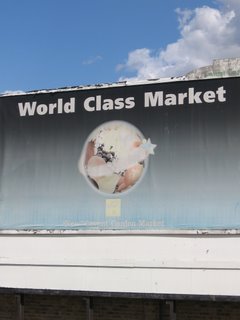
Six days shall the market work, and on the seventh day it shall not rest. Six days of the week the Wholesale Market is London's terminal for fruits and vegetables; produce is delivered, produce dispatched. From South Africa and Thailand, Colombia and Peru, all roads lead to the Market, which every day sucks, devours, spouts and belches tons of food. But on the day of the Lord, the belly of the beast is full, the skips are set aside, and the wide concrete avenues of the Market are overcrowded with shoppers. The beeping sounds of reversing forklifts make way to the happy shouts of children and mothers. It's the Sunday Market.
In four years in London, I have never seen this market mentioned anywhere, in the press or in the media. There is no sign leading to it. The only textual reference is ambiguous and negative: 'No Parking for the Sunday Market' says a banner in the nearby Sainsbury (those who choose to defy the sign carefully wrap their shopping in black plastic bags before they sneak back into the parking lot). As far as I know, it's advertised only by word of mouth. In the heart of London, this invisibility is striking. Walk five minutes to the river and you'll find the London (TM) skyline, London from TV and movies. But the bleak setting of the Wholesale Market and the cheap merchandise on sale leaves very little room for doubt, this is no tourist attraction, no Portobello or Brick Lane, and it cannot be made into one.
What's on sale? Cheap clothing, electric appliances, belts and luggage, shoes, cleaning products, home improvement bits, bike-accessories, children toys, bric-a-brac, fake cds and dvds, and plastic in every shape and form. No handicraft or fair-trade items: the brutal flawless logic of the Wholesale market is alive on Sunday as on any day of the week. Imported goods, whether tomatoes or jeans, belong to the same story: overseas sweat-labour, mass production, cheap costs, and little value.
If you ever wondered how poor people survive in this super-expensive town, how can anyone possibly live here on a cleaner's wage (let alone support a family, and send money to Poland or Nigeria) the Sunday Market provides some answers. It is one of these hidden networks and institutions that make life here possible, that make the difference between having little money and being poor. It's far from grim. The Sunday market is a family affair. The crowd seems mainly African and East European, but also Turkish, Columbian, Chinese, and every nation and language you can think of, all the children of Babylondon: blessed are the poor, for they shall inherit the plastic of the earth. They roam, they browse, they bargain, they buy, they eat hot corn and jerk chicken. It's a fun day out.
By four pm the Market is almost over. Cycle through, you might get lucky and find random plastic moments abandoned by a despaired vendor. The crowds happily disperse, leaving behind mountains of rubbish, cardboard, coat hangers and wrappings. But no worry, after all, waste is what the wholesale market is all about. In a couple of hours, all will be devoured, and the large avenues will be empty and clean, shining of concrete desolation, ready for another week.




2 comments:
when did you put in this new horse-head logo? it's really something.
did you ever read gunter grass' tin drum (or see the movie)? There is a particularly harrowing scene involving a horse head and eels. I highly recommend it. The book and/or the movie, not the scene in particular.
I have turned into a horse over the weekend.
Post a Comment